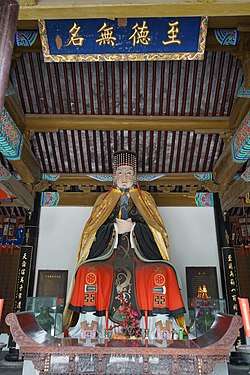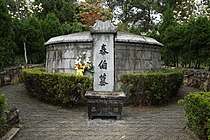Taibo
Taibo (Chinese: 泰伯; pinyin: Tàibó; Wade–Giles: T'ai-po) or Wu Taibo was the eldest son of King Tai of Zhou and the legendary founder of the State of Wu. His birth and death dates are unknown.

Biography
According to Sima Qian, Taibo was the founder of the State of Wu.
Born into the Jī clan (姬) of predynastic Zhou, Taibo was the eldest son of King Tai of Zhou. He had two younger brothers, Zhongyong and Jili. The King of Zhou wished to make his youngest son Jili to inherit the reins of power, so Taibo and Zhongyong traveled southeast and settled in Meili in present-day Jiangsu province. There, Taibo and his followers set up the State of Wu, and made Meili its capital. Taibo's grand nephew, King Wu of Zhou overthrew the Shang Dynasty and started the Zhou Dynasty. However, the tale of Taibo being the founder of the State of Wu is disputed.

During his reign, Taibo developed irrigation, encouraged agriculture, and dug Taibo River (泰伯瀆)[1] which is called Bodu River (伯瀆河)[1] today. When Taibo died, he had no heir and passed the throne to his younger brother Zhongyong. Taibo's shrine was set up in today's Meicun. Although the original wood structure was destroyed during later wars, it has been renovated several times. Present architecture is mostly from the Qing dynasty. A stone carved with Confucius's comment can still be seen in today's Taibo Shrine. Taibo is also customarily known as the propagator of all people with the surname Wu 吳.
After the conquest of Shang dynasty, King Wu of Zhou found Zhouzhang, a great-grandson of Zhongyong, and made him the King of Wu.[2]
Connection to ancient Japan
Ambassadorial visits to Japan by the later Chinese dynasties Wei (Cao Wei, 220–266) and Jin (265-420) recorded that the Wajin (倭人) of Japan claimed to be descendants of Taibo of Wu.[3] Several scholars suggest that the Yamato people and the Yamato Dynasty are descendants of the Wu and possibly Taibo.[4][5]
References
- Wuxi Municipal People's Government Office (2012-04-18). "Taibo River".
River Bo is an abbreviation for Taibo River, which is also called Bodu River and Bodu Port and located in the southeast of Wuxi.
- Sima Qian. "卷三十一·吴太伯世家第一" [31: Family of Wu Taibo]. 《史记》 [Records of the Grand Historian] (in Chinese).
- Encounters of the Eastern Barbarians, Wei Chronicles
- Ng, Wai-ming (2019-02-26). Imagining China in Tokugawa Japan: Legends, Classics, and Historical Terms. SUNY Press. ISBN 9781438473086.
- Brownlee, John S. (2011-11-01). Japanese Historians and the National Myths, 1600-1945: The Age of the Gods and Emperor Jinmu. UBC Press. ISBN 9780774842549.